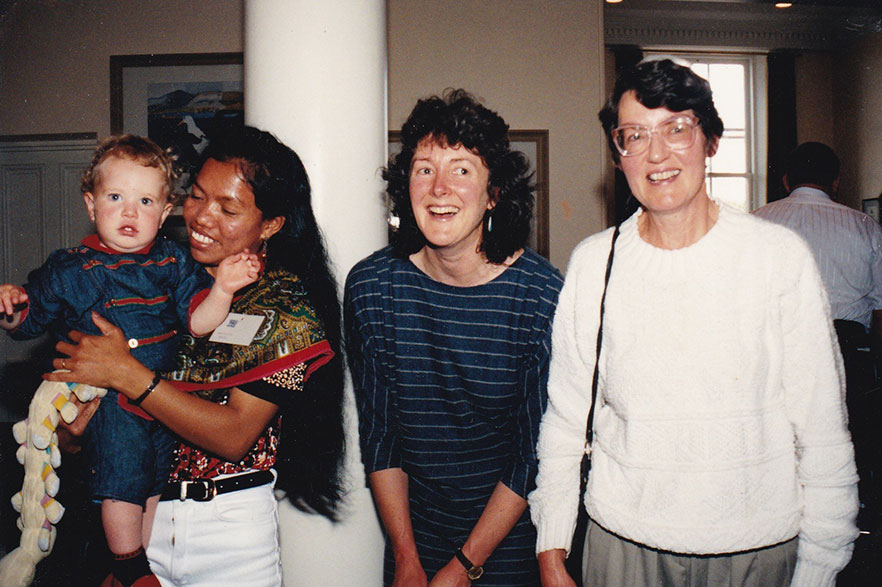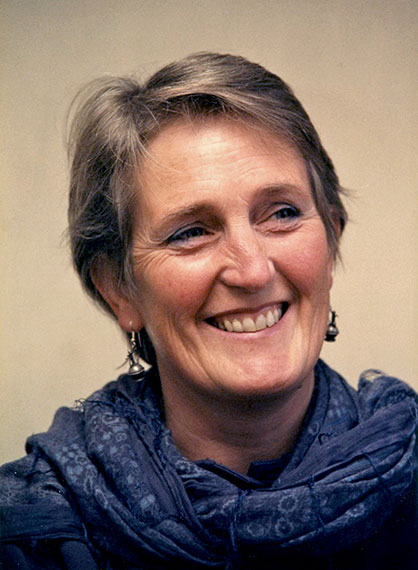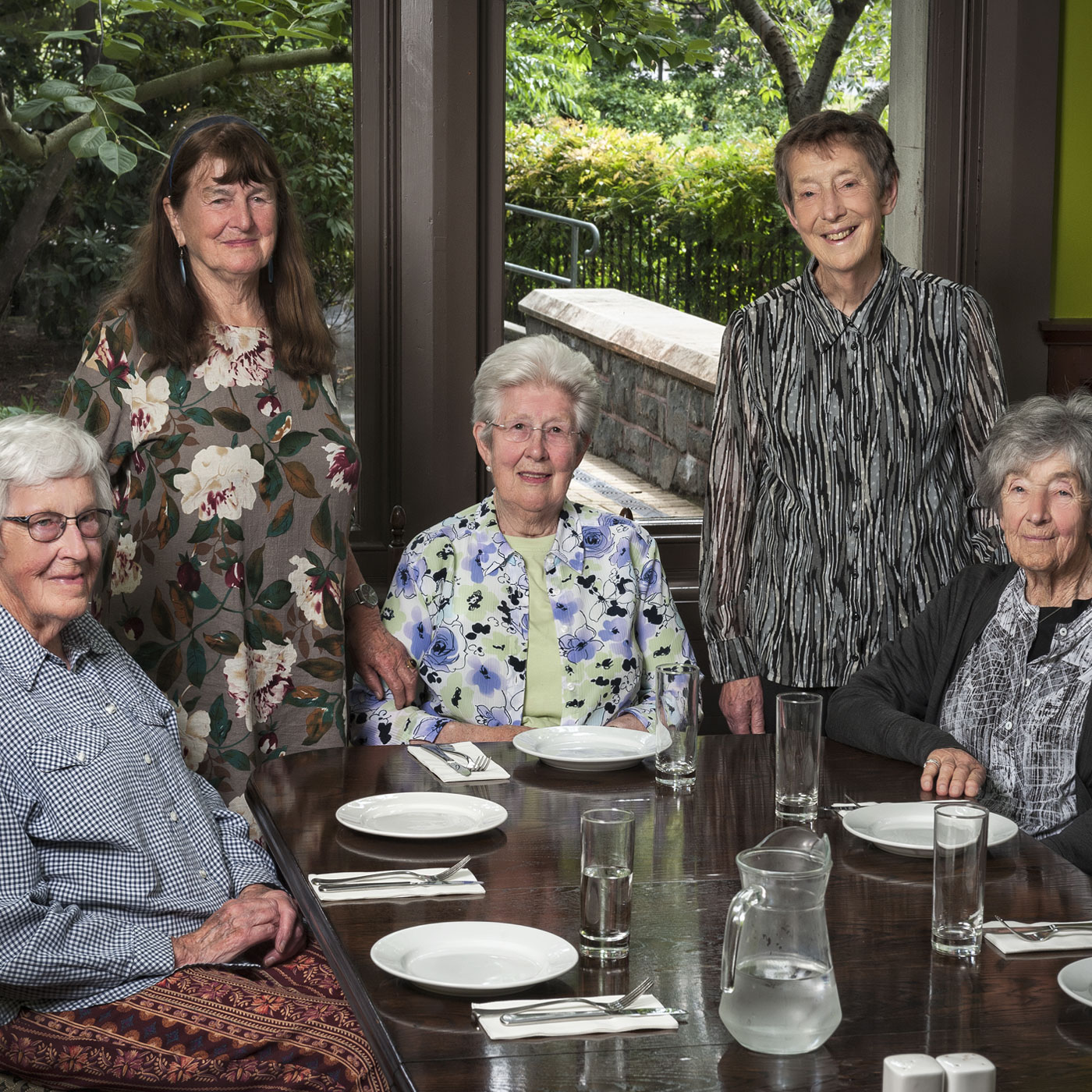Wedded
to the
University
History Professor Barbara Brookes pays tribute to a generation of women – staff wives – who dedicated themselves to building social links on behalf of the University of Otago and the wider community. Their contributions were considerable.
In the preface ofThe Whale's Wake, bearing his name alone as author, historian Harry Morton noted how “my wife and I sought information on three continents, quite apart from our searches in the three islands of New Zealand”. The preface moves easily between “we” and “I” in recording debts. The penultimate sentence reads: “My research assistant and illustrator, Peggy Morton, is also my wife, and has been invaluable to me in all three roles.”.
The preface speaks to an era when academic work might be seen as a joint spousal enterprise, even if the man alone was the author and academic employee. Harry Morton retired from the then History Department in 1983, the year I took up an assistant lectureship and moved into his former office. As a young feminist scholar, I had no wife to type my papers or assist with my research, nor would I have imagined that it was a spouse's role to do so.
Prior to the 1970s, the wives of academics did much more than assist with scholarly work at a time when the University was relatively small and much more intimate, and it is that commitment to social well-being by women that I want to honour here. I can, of course, only note a few of the women who dedicated themselves to building social links on behalf of the University and the wider community.
In an early scholarly study of the role of what was named The Incorporated Wife (1984), Hilary Callan described occupations in which “the social character ascribed to a woman is an intimate function of her husband's occupational identity and culture”.
Such was the identity between husbands and wives that married women up until the 1970s were often known by their husbands' first names, such as Mrs Peter Fraser. A wife's status was elevated by her husband's rank. At that time a woman's first duty was to her family. Only “unfortunate women” used childcare facilities – those forced to work to support themselves. If a couple could afford an at-home nanny, that might have made it possible for a professional woman to work.
Amongst the many demands of second-wave feminists that burst on the scene in the 1970s was that women should no longer be identified by their marital status (Ms was the preferred term) and that childcare should be available so that women could work. Some of those feminists came to Dunedin from the United States and Canada (accompanying their academic husbands) and founded the then-radical Dunedin Collective for Women in 1971. Things, however, were different in the 1950s.
Joyce Joan Herd, known as Bunty to her friends, came to Dunedin from the United Kingdom when her husband, Eric Herd, was appointed to a lectureship in German and French at the University of Otago in 1953. Dunedin was a shock – there were only about two or three restaurants in Dunedin and no decent coffee. A staunch feminist, Bunty Herd later represented the Otago Federation of University Women (FUW) on the National Council of Women (NCW), writing some of the council's most important memos to government at the time. Her commitment to good government meant she served with dedication on the Dunedin City Council.
Named at a time when the ideal of the male breadwinner wage dominated social expectations in New Zealand, a group of wives devoted to developing social bonds seemed unsurprising. It then seemed unremarkable that the group [Staff Wives Association] was called upon to entertain the wives of distinguished visitors or to provide the floral decorations for capping ceremonies.
A long-time Labour Party activist, Bunty worked alongside Islay Little – married to Classicist Doug Little – for Labour Party causes. Bunty volunteered for the YWCA, the Historic Places Ecology Action and the campaigns to save the Clutha and Manapouri. Pat Mark, Bunty's good friend married to distinguished conservationist Alan Mark, was deeply involved in these campaigns and also a local FUW delegate to the NCW.
The year that Bunty and Eric Herd arrived in Dunedin, Professor of Chemistry Frederick Soper became Vice-Chancellor. Eileen Soper, former journalist and Otago Provincial Commissioner for the Girl Guides Association, took up the role of “hostess for the University”, welcoming staff and visitors to the University Lodge. Eileen had been one of the founders of what was then called the Staff Wives Association. That group, established in June 1948, aimed to “to promote friendship between members and to entertain visitors and new arrivals”. Named at a time when the ideal of the male breadwinner wage dominated social expectations in New Zealand, a group of wives devoted to developing social bonds seemed unsurprising. It then seemed unremarkable that the group was called upon to entertain the wives of distinguished visitors or to provide the floral decorations for capping ceremonies.
When not active in preparing for meetings, Bunty Herd found time to write a number of books, the last – Cracks in the Glass Ceiling: New Zealand Women 1974-2004 – completed when she was 84. On her death, a former student described Bunty as the “mother of the modern languages department”.
 Early childhood education was an initiative driven by the wives of men on staff in the 1960s and has been of enormous benefit to a great many families in the decades since. Photographed at the University of Otago Childcare Association in 1991 were now Professor Barbara Brookes (centre) with her son Liam Roth, Lath Kuy and Joan Knox.
Early childhood education was an initiative driven by the wives of men on staff in the 1960s and has been of enormous benefit to a great many families in the decades since. Photographed at the University of Otago Childcare Association in 1991 were now Professor Barbara Brookes (centre) with her son Liam Roth, Lath Kuy and Joan Knox.
Like Bunty, many women married to academics welcomed students into their homes with a ready listening ear, entertained academic visitors and put special effort into welcoming new faculty wives. Julia Musgrave, wife of the Professor of Philosophy and busy mother of five, was a similar “mother” to the Philosophy staff, enjoying discussions with her husband's colleagues about film and literature in which she was well-versed, and entertaining them frequently. A young English woman, Heather Dyke, was appointed to the department in 1998 and knew very little about the country or city she was about to move to. Julia wrote to her in England, sent a copy of the Otago Daily Times, a list of food prices and rental possibilities. On arrival, Heather and her husband were greeted with a welcoming basket of Central Otago fruit and a treasured lifelong friend.
Women appointed as academics didn't meet the “staff wife” criteria and some, such as Ann Wylie, felt cold-shouldered by the group when she arrived as a Botany lecturer. For her the Federation of University Women was much more welcoming in an academic world where it was best to behave as an “honorary man”. Other women academics made it clear that they were not “staff wives” and avoided any association with the group.
For some women, the transformation involved from lecturer to faculty wife could be a shock. Anne Tarrant, a vivacious assistant lecturer in the French Department, married outstanding geologist Professor Doug Coombs in 1956. When she subsequently announced her intention to study for a PhD, her ambition was apparently dismissed and she was told firmly that her role was to support her husband. While it seems Otago did not have any formal rules that applied at some overseas institutions which prevented the employment of wives, informal sanctions were clearly in operation. Anne Coombs hosted a remarkable stream of visitors from all over the world and went with Doug to many exotic and remote places. Her love of French never abated, however, and was carried on by her daughter, Jane, who is now New Zealand's ambassador to Paris.
Academics typically cross the world in search of employment and their families have to relocate. When Judy Robinson's husband was appointed to the Chemistry Department at Otago in 1967, the couple returned to New Zealand from England. Ship-board they met another new immigrant couple bound for Otago, Pauline and Charles Higham. Judy found Staff Wives to be a conservative but very welcoming group, and went to the Thursday morning meetings (where children were welcomed and goods and advice were shared) “rain, hail or snow”.
While the wives of faculty members did much to support the University, they were also active in the wider community, building social bonds. Shirley Child, married to economic historian John Child, was the valued and lively receptionist for the Family Planning Association. She worked alongside Jane Higham, the efficient office manager, married to Business School lecturer Richard Higham. Jane was a mainstay of numerous organisations, from the Budget Advisory Service, the Otago Peninsula Trust, to the University of the Third Age and the Orokonui Sanctuary.

Jane Higham: a mainstay of numerous community organisations.
Apart from Staff Wives, women such as respected language teacher Florence Stone forged firm bonds through the Federation of University Women, now known as Graduate Women International. Dorothea Horsman arrived in Dunedin in 1957. A New Zealander by birth, she completed an MA in History at Auckland University and went teaching, the occupation, along with nursing, regarded as the most suitable for women. At the end of the Second World War Dorothea accompanied her husband Alan Horsman to Oxford. Alan's appointment as Professor of English at Otago brought the couple and their three children back to New Zealand.
Dorothea became involved in Marriage Guidance, the YWCA and the Fortune Theatre. She added her talents to the Federation of University Women, becoming the FUW representative of the NCW. Dorothea completed two reports that signalled the changing times: What Price Equality? (1974 on equal pay for the NCW) and Women at Home (1976 for the FUW). She became national president of both organisations, as well as of the Arthritis and Rheumatism Foundation. For her significant service, Dorothea was made a Dame of the British Empire in 1986.
Two years after Dorothea Horsman's report on equal pay, members of the Staff Wives Association were still being called upon to serve morning and afternoon teas for the Science Congress held at Otago in 1976. But the currents of change were irresistible. In 1972, the Staff Wives Association decided to record the first names of its women members: no longer were they to be known by their husband's initials. A decade later the name “Staff Wives” itself came into question and the group changed its name to the Otago University Staff Families Association.
In 2020 there are women on staff whose husbands play the primary care-giving role in the home. There is, however, no societal expectation that these men should contribute their cooking or floral arranging talents to the University. Restaurant fare, rather than home cooking, is likely to be the preferred entertainment for distinguished visitors when both spouses are busy working.
The University now offers first-class early childhood education, an initiative propelled in the late 1960s by wives of men on staff. Jean Dodd, Katherine Dolby and Barbara Smith all believed in the importance of education for women and thought it wrong that women had to abandon study when they became pregnant. The first priority – of what was initially named the Nursery Association in 1969 – was to assist women to continue tertiary education.
Celebrating its 50th anniversary in 2019, the University of Otago Childcare Association is now likely to caring for the children of staff. My three sons (and my career) benefitted hugely from that care as did many others, including the two daughters of a young American couple hired in Psychology. As a sign of the changed times, Professor of Psychology Mike Colombo now graciously welcomes guests as the husband of Professor Harlene Hayne, the Vice-Chancellor, at the University Lodge.
Meeting recently for lunch at the University Staff Club (from left): Ann Wylie, Islay Little, Barbara Smith, Florence Stone and Pat Mark.
Main photo by Alan Dove

